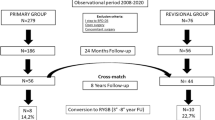Abstract
Background
A failed laparoscopic sleeve gastrectomy (LSG) presents a challenging problem for bariatric surgeons. The aim of this study was to evaluate the indications, treatment strategies, and surgical outcomes of patients who underwent a revisional surgery after a failed LSG.
Methods
This retrospective study included the outcomes of 32 patients who required a revisional surgery from a series of 500 primary LSGs. The patients’ demographic data, indications for revisional surgery, perioperative complications, and postoperative outcomes were recorded.
Results
A total of 500 patients underwent primary LSGs during the study period, and 32 of these patients were subjected to revisional bariatric surgery after a failed LSG. Weight regain, poor weight loss, and gastroesophageal reflux disease (GERD) were the most common causes of revision. A revisional LSG (r-LSG) was performed in 23 patients, while 9 patients received a revisional laparoscopic Roux-en-Y gastric bypass (r-LRYGB). There were complete sleeve pouch dilations in 10 patients. A residual fundus and antrum dilation was detected in 5 and 8 patients, respectively. The r-LRYGB procedure was performed for GERD-related symptoms in 6 patients and 3 other patients underwent r-LRYGB due to the intake of high-caloric foods. The mean operative time, length of hospital stay, and complication rates of revisional surgeries were significantly higher than the total cohort.
Conclusions
Although r-LSG and r-LRYGB seem to be safe and effective treatment options after a failed LSG, revisional procedures were associated with an increased complication rate. Attention to technical details of the primary LSG may reduce the revision requirements.
Similar content being viewed by others
References
The National Institutes of Health Conference. Gastrointestinal Surgery for Severe Obesity. Consensus Development Conference Panel. Ann Intern Med. 1991;115(12):956–61.
Miller WC, Koceja DM, Hamilton EJ. A meta-analysis of the past 25 years of weight loss research using diet, exercise or diet plus exercise intervention. Int J Obes Relat Metab Disord. 1997;21(10):941–7.
Christou NV, Sampalis JS, Liberman M, et al. Surgery decreases long-term mortality, morbidity, and health care use in morbidly obese patients. Ann Surg. 2004;240:416–23.
Prevot F, Verhaeghe P, Pequignot A, et al. Two lessons from a 5-year follow-up study of laparoscopic sleeve gastrectomy: persistent, relevant weight loss and a short surgical learning curve. Surgery. 2014;155(2):292–9.
Cetinkunar S, Erdem H, Aktimur R, et al. The effect of laparoscopic sleeve gastrectomy on morbid obesity and obesity-related comorbidities: a cohort study. Ulus Cerrahi Derg. 2015;31:202–6.
Elbanna H, Ghnnam W, Negm A, et al. Impact of preoperative body mass index on the final outcome after laparoscopic sleeve gastrectomy for morbid obesity. Ulus Cerrahi Derg. 2016;32:238–43.
Kehagias I, Karamanakos SN, Argentou M, et al. Randomized clinical trial of laparoscopic Roux-en-Y gastric bypass versus laparoscopic sleeve gastrectomy for the management of patients with BMI < 50 kg/m2. Obes Surg. 2011;21(11):1650–6.
Weiner RA, Theodoridou S, Weiner S. Failure of laparoscopic sleeve gastrectomy—further procedure? Obes Facts. 2011;4(1):42–6.
Himpens J, Dobbeleir J, Peeters G. Long-term results of laparoscopic sleeve gastrectomy for obesity. Ann Surg. 2010;252(2):319–24.
Karamanakos SN, Vagenas K, Kalfarentzos F, et al. Weight loss, appetite suppression, and changes in fasting and postprandial ghrelin and peptide-YY levels after Roux-en-Y gastric bypass and sleeve gastrectomy: a prospective, double blind study. Ann Surg. 2008;247(3):401–7.
Abdallah E, El Nakeeb A, Yousef T, et al. Impact of extent of antral resection on surgical outcomes of sleeve gastrectomy for morbid obesity (a prospective randomized study). Obes Surg. 2014;24(10):1587–94.
Braghetto I, Cortes C, Herquinigo D, et al. Evaluation of the radiological gastric capacity and evolution of the BMI 2-3 years after sleeve gastrectomy. Obes Surg. 2009;19(9):1262–9.
Noel P, Nedelcu M, Nocca D, et al. Revised sleeve gastrectomy: another option for weight loss failure after sleeve gastrectomy. Surg Endosc. 2014;28(4):1096–102.
Silecchia G, De Angelis F, Rizzello M, et al. Residual fundus or neofundus after laparoscopic sleeve gastrectomy: is fundectomy safe and effective as revision surgery? Surg Endosc. 2015;29(10):2899–903.
Nedelcu M, Noel P, Iannelli A, et al. Revised sleeve gastrectomy (re-sleeve). Surg Obes Relat Dis. 2015;11(6):1282–8.
Lombardo M, Bellia A, Mattiuzzo F, et al. Frequent follow-up visits reduce weight regain in long-term management after bariatric surgery. Bariatr Surg Pract Patient Care. 2015;10(3):119–25.
Saunders R. “Grazing”: a high-risk behavior. Obes Surg. 2004;14(1):98–102.
de Zwaan M, Hilbert A, Swan-Kremeier L, et al. Comprehensive interview assessment of eating behavior 18-35 months after gastric bypass surgery for morbid obesity. Surg Obes Relat Dis. 2010;6(1):79–85.
Hsu LK, Sullivan SP, Benotti PN. Eating disturbances and outcome of gastric bypass surgery: a pilot study. Int J Eat Disord. 1997;21(4):385–90.
Barrett AM, Vu KT, Sandhu KK, et al. Primary sleeve gastrectomy compared to sleeve gastrectomy as revisional surgery: weight loss and complications at intermediate follow-up. J Gastrointest Surg. 2014;18(10):1737–43.
Cohen R, Pinheiro JS, Correa JL, et al. Laparoscopic revisional bariatric surgery: myths and facts. Surg Endosc. 2005;19(6):822–5.
Stefanidis D, Malireddy K, Kuwada T, et al. Revisional bariatric surgery: perioperative morbidity is determined by type of procedure. Surg Endosc. 2013;27(12):4504–10.
Iannelli A, Schneck AS, Noel P, et al. Re-sleeve gastrectomy for failed laparoscopic sleeve gastrectomy: a feasibility study. Obes Surg. 2011;21:832–5.
Cheung D, Switzer NJ, Gill RS, et al. Revisional bariatric surgery following failed primary laparoscopic sleeve gastrectomy: a systematic review. Obes Surg. 2014;24(10):1757–63.
Author information
Authors and Affiliations
Corresponding author
Ethics declarations
The study was approved by the local ethics committee.
Conflict of Interest
The authors declare that they have no competing interests.
Statement of Informed Consent
The need for patient informed consent for this retrospective study was waived by the institutional review board.
Rights and permissions
About this article
Cite this article
Yilmaz, H., Ece, I. & Sahin, M. Revisional Surgery After Failed Laparoscopic Sleeve Gastrectomy: Retrospective Analysis of Causes, Results, and Technical Considerations. OBES SURG 27, 2855–2860 (2017). https://doi.org/10.1007/s11695-017-2712-8
Published:
Issue Date:
DOI: https://doi.org/10.1007/s11695-017-2712-8




